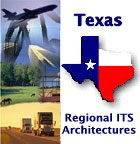

|

|

|

|

|

|

|

|

|

|
City of Livingston Fire/Police/EMS Dispatch and PSAP Equipment Packages |
 |
The following equipment packages are associated with the "City of Livingston Fire/Police/EMS Dispatch and PSAP" element. Select the "Details" icon to see the detailed requirements associated with each equipment package, or consult the National ITS Architecture web site for more information.
Center Secure Area Alarm Support
![]()
Collection and response to silent and audible alarms received from travelers in secure areas (such as transit stops, rest areas, park-and-ride lots) and from on-board transit vehicles.
Center Secure Area Sensor Management
![]()
Management of security sensors, analysis of sensor data, correlation with surveillance data and alerts from other agencies to detect potential threats, and dissemination of threat information to other agencies. Sensors may be placed in areas such as transit stops, transit stations, rest areas, park and ride lots, modal interchange facilities, on-board a transit vehicle, etc.
Center Secure Area Surveillance
![]()
Management of security surveillance devices and analysis of that data to detect potential threats. Areas under surveillance may include transit stops, transit stations, rest areas, park and ride lots, modal interchange facilities, on-board a transit vehicle, etc.
Provides interface to the emergency call-taking systems such as the Emergency Telecommunications System (e.g., 911) that correlate call information with emergencies reported by transit agencies, commercial vehicle operators, or other public safety agencies. Allows the operator to verify the incident and forward the information to the responding agencies.
Collection and storage of information related to Emergency Management. For use by operations personnel or data archives in the region.
Dispatch emergency vehicles to incidents, tracking their location and status. Pertinent incident information is gathered and relayed to the responding units; includes requests for signal preemption.
Emergency Early Warning System
![]()
Monitors alerting and advisory systems, information collected by ITS surveillance and sensors, and reports from other agencies in order to identify potential, imminent, or in-progress major incidents or disasters. Notification is provided to other ITS centers to notify the traveling public. Includes support for Child Abduction notices.
Evacuation planning and coordination to manage evacuation and reentry of a population in the vicinity of a disaster or other emergency that poses a risk to public safety.
Strategic emergency planning and response capabilities and broad inter-agency interfaces to support large-scale incidents and disasters, commonly associated with Emergency Operations Centers.
Routing of emergency vehicles to facilitate the quickest/safest arrival. Routes may be determined based on real-time traffic information and road conditions or routes may be provided by Traffic Management on request.
Tactical decision support, resource coordination, and communications integration among emergency management agencies for Incident Commands that are established by first responders to support local management of an incident.
Collection and response to Mayday messages received from vehicles and drivers.
 Web Spinner Technology.
Web Spinner Technology.